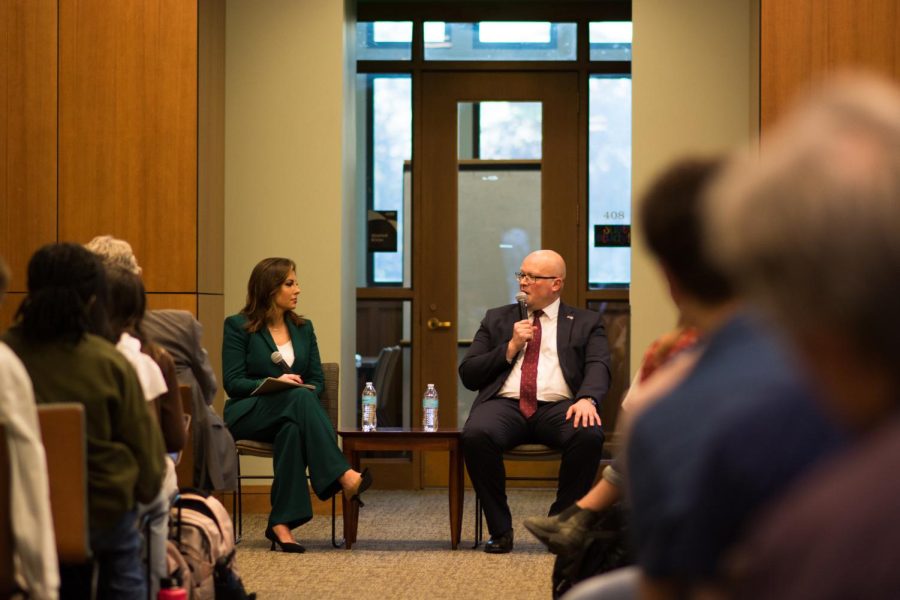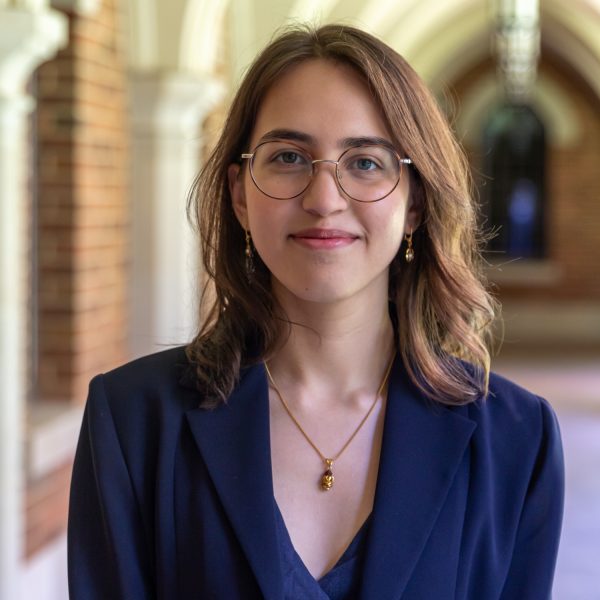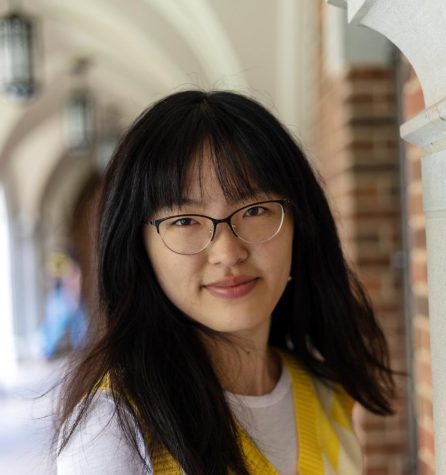Vanderbilt hosted a “Fireside Chat” with the Ambassador of Finland Mikko Hautala on Nov. 9, where he discussed the war in Ukraine, U.S.-Finland relations and his country’s bid for NATO membership. Hautala was appointed as the ambassador from Finland to the U.S. in September 2020, before which he served as the Ambassador to Russia and the Ambassador to Ukraine.
Former U.S. State Department Spokesperson Morgan Ortagus moderated the discussion. Ortagus met Hautala at an event in Washington, D.C. and worked with the Department of European Studies to invite him to speak at Vanderbilt. Ortagus said that she intentionally wanted to bring Hautala to what she referred to as “real America,” outside of diplomacy hubs such as Washington, D.C.
“I’m a big believer that we talk in a bubble to each other in DC, and that terrible foreign policy decisions get made that way,” Ortagus said. “One of the things that I’ve been incredibly passionate about is bringing foreign policy and national security discussions to real America.”
After Dean of the College of Arts & Science John Geer introduced the two speakers, Hautala began by addressing Ukrainian members of the audience by speaking in Ukrainian. Hanna Kostavic, a first-year from Ukraine who attended the event, was excited about the views Hautala shared regarding the conflict in her home country.
“I really liked the way they composed it because I’ve come to expect, listening to a lot of leaders, a way of justifying the Russian side, but he didn’t do that,” Kostavic said. “I’m very excited to have a totally pro-Ukrainian politician—it hits me in my heart.”
Kostavic added that she appreciated how Russia’s aggression was not framed as a tactic against NATO but rather an “ideological” and “imperialistic” attack.
“It was not about NATO expansion—it was more about values and obsessionist imperialistic ideas and how Russia has to come to clear every neighboring country,” Kostavic said.
In an interview with The Hustler, Hautala said that Finland’s history of conflict with Russia was critical in informing the country’s approach to the current conflict. In 1940, Finland won the “Winter War” after a year of conflict following Russia’s attempts to take control of Finland.
“It’s been almost 80 years of peace, but history informs us that you have to maintain a critical military force,” Hautala said. “You have to strive at having a good relationship with them [Russia], as far as you can do it on your own.”
Since the war in Ukraine began, Finland has taken steps to cut Russian immigration to Finland and secure their borders. Hautala said that these decisions are critical to the country’s security during the conflict.
“We are taking those decisions on the basis around security assessments,” Hautala said. “We obviously would not like to see any of those measures being taken, but since the Russians started to attack, we have to respond.”
Hautala added that Finland’s own experience with Russian aggression helped inform the country’s decision to jointly apply to become a NATO member-state, along with Sweden, on May 18, 2022. Finland and Sweden are currently awaiting the approval of Turkey and Hungary in order to join NATO.
“Our history is informing our foreign policy choices in so many ways; joining NATO, which is our current policy, I think is also informed by history because if Russia starts to act aggressively, it starts illegal attacks against its neighbors,” Hautala said. “Obviously, it’s very logical that you will increase your cooperation to join the alliance as a reaction to that behavior.”
Hautala also said that relations with the U.S. have been critical to equipping Finland with the necessary military resources to protect themselves from Russia during the ongoing conflict. The Biden Administration proposed a potential $535 million arms sale to Finland on Nov. 2.
“Our defense relations have been strong already, since the early 90s,” Hautala said. “So there’s a long history as we are regularly buying defense material from the US, and it happens all the time. I think our relations are strong, and they will go somewhere in the future.”
Hautala added that he hopes that the conflict resolves so that Finland can return to welcoming Russian immigrants and resume cooperative relations with the country.
“It [the conflict] is something that will change the situation we had with the many Russians that used to come to Finland fairly often, but I hope that the future will bring back some of the opportunities that we have lost now,” Hautala said. “But as long as we don’t see that happening, I think we need to keep on making sure that our border security is being improved.”
Hautala explained that he thinks the potential of nuclear weapons being used in this conflict is still unlikely, despite being a source of concern from the international community.
“I think it’s always a major cause of worry if somebody who is holding the second nuclear superpower in the world, is speaking lightly and making nuclear threats—I think it’s a really serious situation,” Hautala said. “I still think that the actual use of nuclear weapons is still far away.”
Hautala added that it is important for the international community to signal to Russia that nuclear aggression poses unimaginable risks to the entire world.
“This is something that we have to really keep our eyes on and we have to monitor carefully,” Hautala said. “We also have to send the message to the Russians that this should never be done, because the risks will be really big, not only for us, but also for the Russians.”
Hautala concluded by saying that relations between Finland and the U.S. are critical during both wartime and peacetime, adding that he thinks the two countries are invested in a shared future.
“It’s tough times because you have so much conflict, you have so much uncertainty,” Hautala said. “I think the really important thing which also unites our people is that we do believe that by focusing on doing something practical and improving your knowledge, we can improve our futures.”
To do this, Hautala believes the two countries must prioritize shared goals and solidarity.
“I think one common lesson is that we need to keep on increasing the ties between our countries. We have to focus on learning science,” Hautala said.














